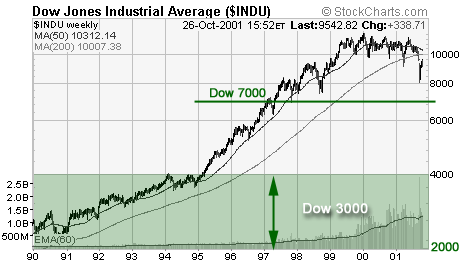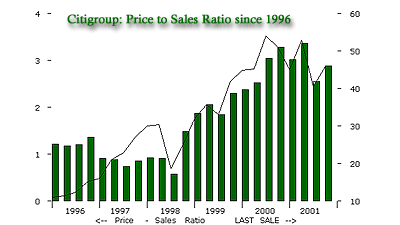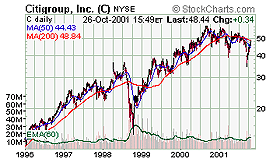GIC
A Weekly Outlook and Analysis of the
Global Investment Climate
28 October 2001
At the early stages of a new price trend, the majority of investors still remain committed to the old price trend. The previous trend has already finished, but its termination has not yet been generally recognized. A minority of investors will have begun to suspect that a price reversal is at hand, and will be altering the balance of their portfolios. However, even for this group, there will be some degree of uncertainty about the future course of prices: portfolio balances will be altered to only a relatively small degree and there will be a tendency to reverse profitable trades very quickly rather than take the longer term view.
At the beginning of a bull trend the fear of making losses still predominates, while at the start of a bear trend greed (or a fear of missing further profits) tends to stop people from selling a significant proportion of their investments. Consequently, at the early stages of a price trend, the emotional commitment of the (ultimately) successful crowd to that trend is weak.
- Tony Plummer
The Psychology of Technical Analysis
Revised 1993 edition
Confidence Test
If we're trying to understand recent market activity, this is a terrific
assessment. At early points in a developing primary trend then, bears
begin questioning themselves, looking at old charts and trying to remember
why they were bearish. Their young conviction is fickle, and corrective
forces powerful.
But we know a bear whose conviction is neither young nor fickle, and whose force we predict will become ever more powerful in the primary bear market that he is certain will last for many years to come. David Tice is the man whose name young cubs will undoubtedly grow familiar with, if he is correct.
To be sure, although he manages the Prudent Bear fund as well as the Safe Harbor fund, which includes gold shares, Mr. Tice makes it apparent that this is not only his show. In his answer to our introductory question (the recipe for his success) he emphasized that it is the first-rate talent on his team, which is largely responsible for his conviction, and thus success.
 |
|
|
Dow Jones
Industrial Average
|
For those of you unfamiliar with David Tice see this link to his biography. According to his October 8 letter, the Bear fund, which boasts assets of over $100,000,000, is a little over 60% short at the moment. In its final paragraph Tice and associates says that:
The Prudent Bear Fund was heavily invested in put options during the steepest part of September's decline. We lightened our short exposure in the last week of the month in anticipation of a sharp rally. We have increased short positions in cyclicals and financials as we are convinced that a steep recession is underway. We have also added more gold stocks to our long positions. In our view, the rally in gold will continue, especially if the dollar continues to weaken as we expect. (October 8, 2001)
Don't Mess with Mother Nature
Bugos: Good morning David, what is your diagnosis of the present global economic malaise?
Tice: This is the aftermath of a credit bubble that (has been crashing). Too much debt was created, which financed too many ill-conceived ventures that will never be profitable.
Bugos: You have been bearish on stock prices for some time now, correctly I might add, and continue to be. What predominantly fundamental factor(s) continues to augment the bullish case, and prevent the immediate resolution of your outlook?
Tice: There is a great deal of hope among investors that the market will come back. Stock prices are the result of the interplay between fear and greed, and there's a significant spectrum of feelings in between. Currently, we are in the process where investors are shifting their attitudes increasingly more towards skepticism and fear, and further away from greed but it takes some time after a phenomenal 18-year bull market (has been ingrained in investor psychology). As this shift is made, stocks go lower, but it takes time until the collective light bulb goes onů that the bullish arguments don't make sense anymore.
Bugos: That sure can take a long time, particularly if the Fed continues to finance the bullish case (fighting the trend if you will). How long and how far do you see this bear market declining?
Tice: It will take years to correct the excesses. Borrowing a quote, we like to say that policymakers shouldn't mess with Mother Nature, and if they do, then they can either pay now or pay later. They continue to defer the cost of intervention into the future. This whole process could take three to five years to complete, and the Dow will fall to below 4000, and maybe to as low as 2000.
Bugos: Wow! That means the average Dow stock will be worth somewhere in the neighborhood of a third of today's value, by the end of it all, though by then the Dow might have a marginally different composition as well. What is it about bank shares that keep them aloft?
Tice: Well, Citigroup is at the core, a driver of this entire credit bubble.
Bugos: What does that mean for their fundamentals?
Tice: Lower interest rates and an accommodative credit environment have allowed financial institutions to lend even more money to often less than credit worthy individuals and businesses. This aggressiveness has increased the denominator in the loan default ratios, making it appear that credit quality is not falling as quickly as it really is, as newly extended loans don't default that quickly.
Bugos: That doesn't sound too good for the economy, or dollar either. What did all these smart guys overlook on the way up?
Tice: The willingness of policymakers to allow our financial system to create more credit than could have ever been imagined to keep the boom going. The system loaned more money to sub prime borrowers, and also against real estate than could have been anticipated.
Bugos: This of course is all done on America's tab, since it is funded by a fractional reserve system, which up until 1999 had a Congressional mandate. During 1999 the bill that required Chairman Greenspan to appear before the Congress in order to justify monetary policy had expired. Under this bill, the Fed had an official mandate, full employment as per the Humphrey Hawkins legislation of 1978. While a new mandate has yet to be decided upon it is widely perceived that the Fed successfully achieved its goal of full employment, clearly through fueling this credit bubble. Any thoughts on this, or ideas as to what should be their new mandate?
Tice: We need to change the mandate of the FED to promote stability of the currency and the financial system as well as avoid any reference to either full employment, or maximizing growth, in their constitution. A lesson that must be learned from the current debacle is that the FED cannot allow the financial system to let credit growth get out of control. The FED has to prevent asset bubbles from developing. It must be run by a tough individual willing to take on Wall Street and take the punch bowl away when the party gets out of hand. Too much coddling to Congress is probably a bad idea, unless the Chairman can be extremely effective in educating politicians.
Bugos: Oh my goodness, who would have guessed that politics has anything to do with the stock market. What is your outlook on gold prices over the next five years?
Tice: I believe that gold prices will skyrocket. Gold should perform well in either an inflationary or deflationary period, and I am still uncertain as to how this will play out but I am very very (the double positive is not a typo) confident that the US dollar will decline in value relative to gold.
Bugos: Should investors transfer a portion of their wealth into bullion - why, or why not?
Tice: Yes they should. As already mentioned before, gold represents an outstanding investment in either an inflationary or deflationary scenario. Gold is the one asset that is also not someone else's liability. The central banks of the world will pull out all the stops to prevent the crisis from intensifying, and this will probably involve creating more credit, which again will be good for gold.
Bugos: Let's take you to task on that. If the investor had to allocate assets between two hypothetical options, neither of which were negotiable until maturity - physical bullion or a five year US government treasury bond - how would you suggest they allocate, assuming they are both redeemable for US dollars after five years?
Tice: I would allocate all to bullion. Gold should perform phenomenally well over the next five years.
Bugos: Indeed. What are your three favorite short candidates in the Dow?
Tice: Citigroup, IBM, and Home Depot all sport unsustainable valuations. While they have generally held up better than their peers in the Dow, Home Depot has been a tremendous beneficiary of the credit bubble and resultant consumption boom. IBM' services businesses and aggressive accounting policies have kept appearances, but their other fundamentals are faltering and we expect its share price to fall in line with the rest of the market as a consequence
(of some of these things).
Bugos: Can you think of any circumstances evolving today that might change your outlook on either gold or the stock market? In other words, what would it take for the Dow to make it to 15000 by next year or for gold prices to fall to $150 an ounce?
Tice: The secular bull market has ended and a secular bear market has begun. The massive credit bubble has burst and there's no reversal possible in my opinion. Growth in consumer credit has now slowed and defaults are accelerating in both business and consumer loans.
The consumer has kept the boom alive over the last six months and now he's running out of credit capacity and his confidence is slipping. Additionally, the dollar has now peaked, and an increasingly wary foreign buyer who realizes that the American pyramid scheme has ended will no longer finance additional credit growth. The excesses and imbalances are simply too great and now they'll have to be worked off. Additional credit growth, which has kept the boom going so many times in the past, will simply be insufficient to fuel the market to new highs. Also, for gold we believe the dollar has peaked,
MZM growth remains in excess of 20% (monthly), and as we said, loan defaults are accelerating. In this environment, we do not envision any scenario where gold could fall to $150 USD/oz.
Bugos: So much for that. Do you have a message for Washington's puppets at this time?
Tice: I will defer to the great Henry Kaufman who stated at our September 1999 Credit Bubble symposium that "the Fed has missed its timing." What Kaufman was saying is that the Fed unfortunately erred badly in the 1990's by not restricting credit growth earlier and by not preventing the asset bubble in equities and real estate from getting out of hand and now, unfortunately, policymakers' options are limited. More credit to defer the eventual decline will prove (is proving) counterproductive. Unfortunately, the US economy is living beyond its means, we're spending far in excess of what we're earning, and now we'll have to retrench. Unfortunately, the adjustment process will be very painful for millions of Americans (and Canadians), because policymakers let credit expansion go on far too long.
Bugos: Thank you for your time David, we know you're going to be right.
Don't stop there though, there's much more where that came from. In this issue of the GIC the topics up for analysis are:
- Why the next leg will turn down this week, and nail our own objective at Dow 7000 by the time it completes
- Is it a secular bear or still a secular bull market, in equities?
- What's holding up the NYSE Advance Decline line?
- What might Chaos theory conclude from the Sep 11 "random variable"?
- Our six favorite selling candidates in the Dow
- 15 Reasons to be bullish on gold, and gold shares
- World Gold Council leaks exciting potential for gold linked instruments
- Is there, or isn't there, money and credit manipulation?
|
Good luck,
Edmond J. Bugos
The GoldenBar Global Investment Climate is not a registered advisory service and does not give investment advice. Our comments are an expression of opinion only and should not be construed in any manner whatsoever as recommendations to buy or sell a stock, option, future, bond, commodity or any other financial instrument at any time. While we believe our statements to be true, they always depend on the reliability of our own credible sources. Of course, we recommend that you consult with a qualified investment advisor, one licensed by appropriate regulatory agencies in your legal jurisdiction, before making any investment decisions, and barring that, we encourage you to confirm the facts on your own before making important investment commitments.

